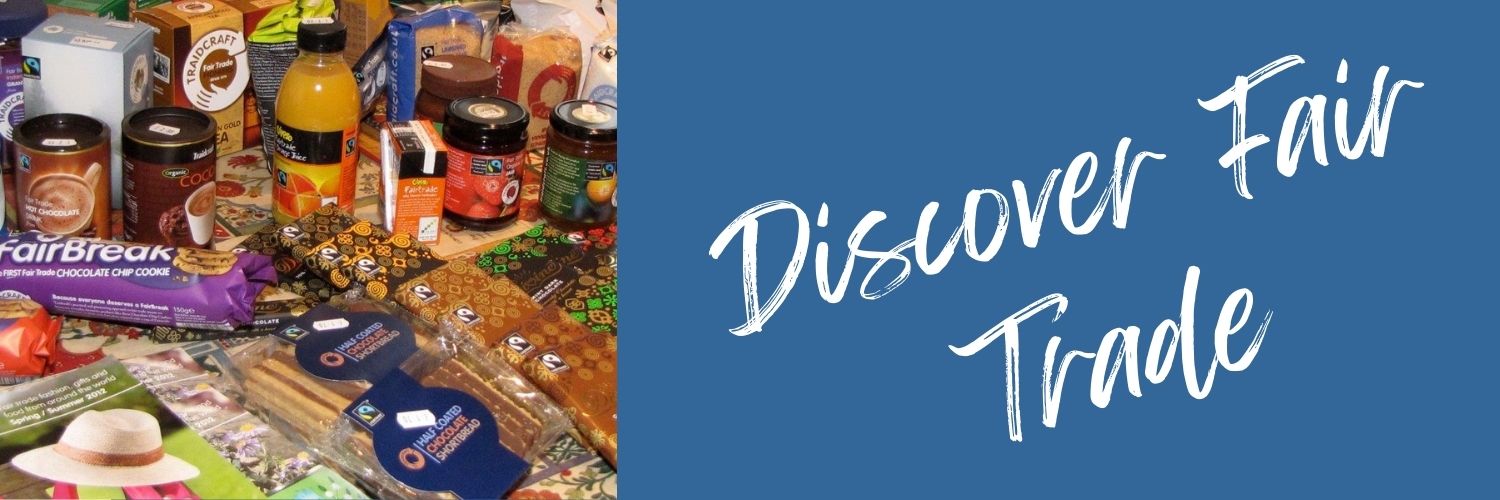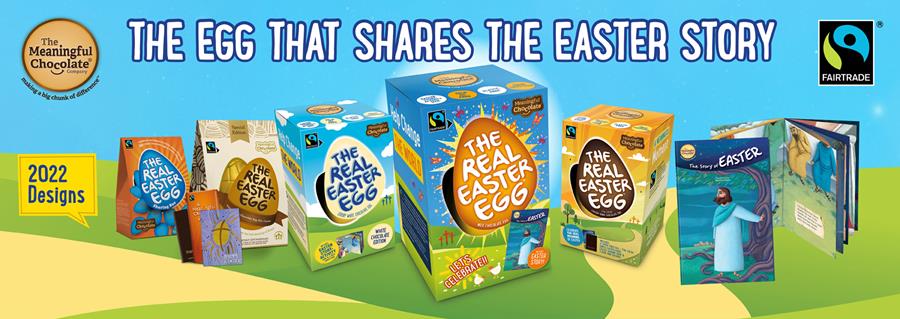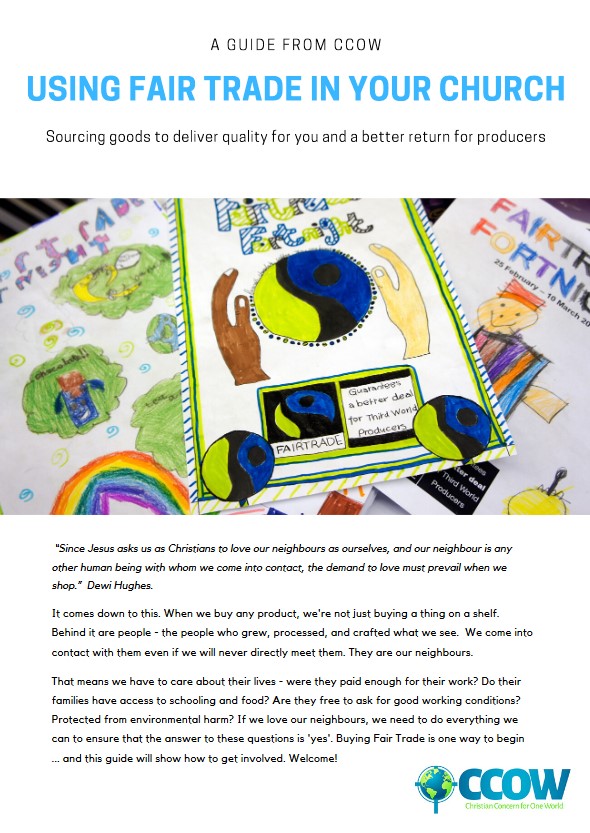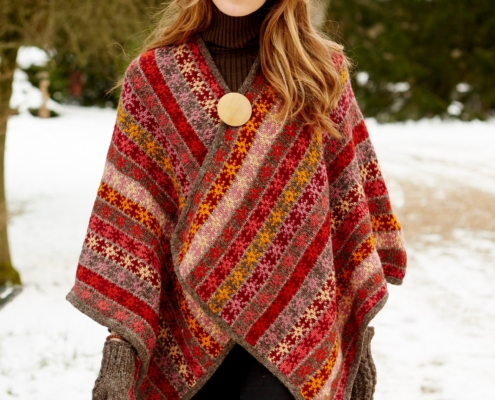A Fair Trade Easter
Get ready to celebrate Easter with gifts that both give enjoyment and honour God’s call to love our neighbours. Order online via the links for each product, or go to your local Fair Trade shop to find these and other delightful gifts.
Local shops: Fair Trade at St Michael’s (FTSM) and Headington Fair Trade (HFT) in Oxford, Cornerstone (CO) in Grove, Just Trading of Wallingford (JTW), Mustard Seed (MS) in Faringdon, RISC World Shop in Reading (RISC)
Photo: Meaningful Chocolate Company
The Real Easter Egg
It’s made of Fairtrade chocolate. It comes with a booklet sharing the Easter story. It’s palm-oil free. And it comes in a huge range of varieties – large dark and milk chocolate eggs, a fun ‘egg box’ with 6 egg-sized chocolates, and a wonderful sharing box that you can use to make sure everyone in your congregation gets a treat. Order them yourself, take orders for your church, or spread some Easter good news to a food bank.
Individual eggs:
£4.80 – milk chocolate
£5.00 – fun pack
£5.50 – dark chocolate
Sharing box (30 egg-sized eggs) – £30
Case of 6 eggs:
£27.00 – milk chocolate
£33.00 – dark chocolate
There are also special prices if you buy to donate to a foodbank.
Available from Meaningful Chocolate Company, FTSM, HFT, MS, RISC.
Bonus: Take a look at the Easter story book in this video
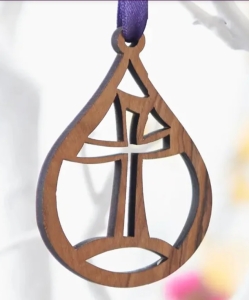
Cross ornament
“This exquisite olive wood decoration with unique tear drop shape and purple ribbon for hanging evokes the pain and promise of the cross and makes a beautiful gift or tree decoaration.” Handcrafted by a Fair Trade cooperative in Bethlehem in the Holy Land.
£4.99 Available from Embrace the Middle East. See the full Embrace range of Easter decorations here.
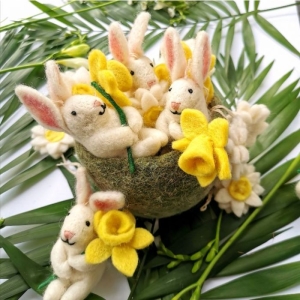
Fantastic Felt
From Nepal, Felt So Good has a range of wonderful Easter felt decorations. From tiny Easter chicklets to adorable rabbits, Easter eggs, and flowers, they’ll be charming in an Easter basket. See the full range here.
£4.96 up from Felt So Good,
Fair Trade at Church
It’s so good to be getting back together in person – and it offers us the chance once again to use Fair Trade products for refreshments and special events. Click on the picture above to take a look at our guide, chock full of ideas and links to suppliers.
Gift Guides
Keeping Warm … the Fair Trade Way
If you’re after a jumper to keep you warm on chilly evenings,…
Fair Trade Facts
What is Fair Trade?
An inspiring definition of Fair Trade was agreed in 2001 by key organisations in the Fair Trade movement, including the World Fair Trade Organization, which certifies Fair Trade organisations, and the Fairtrade Labelling Organization, which is responsible for the Fairtrade label.
It reads: ““Fair Trade is a trading partnership, based on dialogue, transparency and respect, that seeks greater equity in international trade. It contributes to sustainable development by offering better trading conditions to, and securing the rights of, marginalized producers and workers – especially in the South.
Fair Trade organizations have a clear commitment to Fair Trade as the principal core of their mission. They, backed by consumers, are engaged actively in supporting producers, awareness raising and in campaigning for changes in the rules and practice of conventional international trade. They can be recognised by the WFTO logo.
Fair Trade is more than just trading: it proves that greater justice in world trade is possible. It highlights the need for
change in the rules and practice of conventional trade and shows how a successful business can also put people first.“
What’s the difference between Fair Trade and Fairtrade?
‘Fairtrade’ may be more familiar to UK audiences – it’s the term that can be applied to products that are certified by the Fairtrade Foundation according to international Fairtrade standards. Fairtrade standards are vital – they ensure safe working conditions, good environmental practices, contracts that honour producers’ work, and both a minimum price and a premium, set for each product.
Most Fairtrade products relate to things we eat or drink – from the familiar tea, coffee, bananas and chocolate to the less familiar but well-worth trying dried fruits, pulses, nuts and rice. Fairtrade isn’t just about food, though: there are also Fairtrade standards for flowers, gold, and cotton.
Fairtrade certification applies to products, not to companies.
‘Fair Trade’ (two words, both capitalised) is used for products that come from Fair Trade Organizations, which are certified by the World Fair Trade Organization. These organisations are dedicated to Fair Trade – and everything they produce meets Fair Trade standards. Some of the most familiar to a UK audience would be People Tree and
We also sometimes use Fair Trade to refer to goods that come from organisations that are members of BAFTS, the British Association of Fair Trade Shops. The members of BAFTS distribute and sell these goods because they believe them to be authentically in the spirit of Fair Trade, even if they are not necessarily from organisations that are certified by the WFTO.
What about ‘fair trade’ and ‘fairly traded’? These are terms that don’t have any official meaning, so they are defined simply by the companies that use them.

